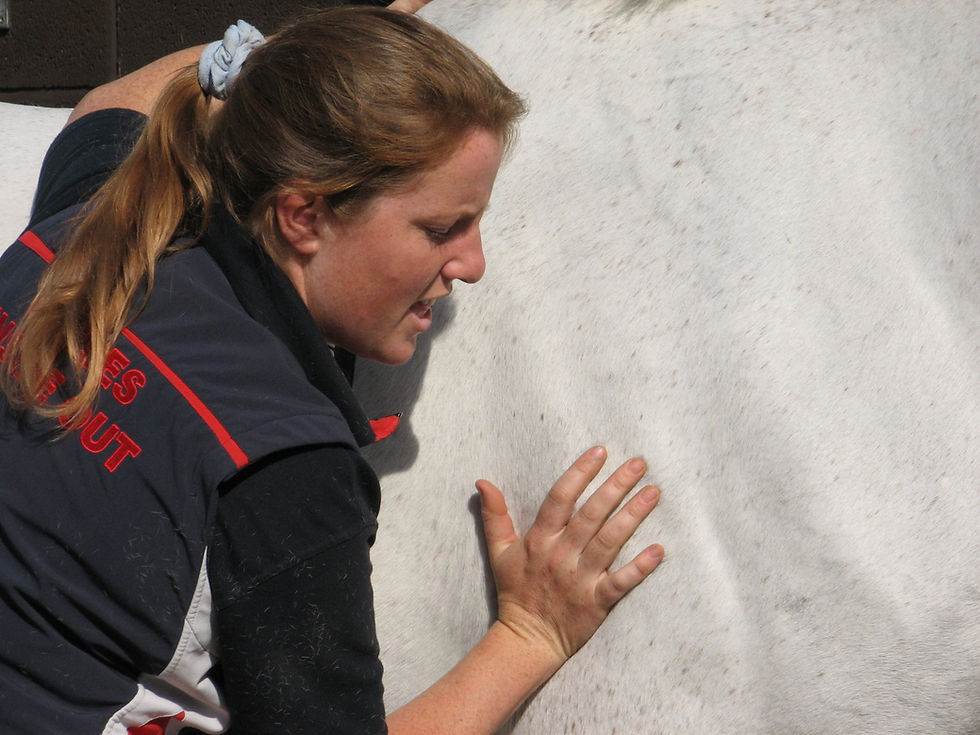Fascial Release Techniques
2 Day CPD Course for Professional Equine Therapists
with Gillian Higgins
Monday 16th and Tuesday 17th June 2025
Wavendon Grange, Lawn Lane, Old Dalby, Leicestershire, LE14 3LW
Unlock the potential of fascia in equine therapy with our comprehensive CPD course, designed exclusively for professional equine therapists. This course delves deep into the structure, function, and role of fascia in equine movement, offering hands-on techniques that enhance your therapeutic practice. You’ll learn how to assess, treat, and improve fascia-related restrictions, improving flexibility, mobility, and overall horse well-being. By mastering these advanced fascia techniques, you will add powerful tools to your skill set, empowering you to deliver more effective, holistic treatments. Enhance your confidence and competence, elevate your practice, and foster long-term positive outcomes for your equine clients.

Course Trailer
This course is suitable for qualified therapists from all disciplines wishing to revise techniques or explore new ones to add to their toolbox.
It is a mix of theory, practical demonstrations and small group hands-on practical sessions. It also provides the opportunity to network, share information and discuss interesting or challenging cases with other practitioners in a relaxed and supportive environment.
During this course we will look at the anatomy of different types of fascia, fascial connections, function, dysfunction and how to keep it healthy.
This course is supported by incredible photographs and video footage of fascia from Gillian's dissections.
At the end of this course as well as the ability to visualise fascia you will go away with fascial palpation techniques and a variety of fascial release techniques.
This course is an excellent precursor to the
Myofascial Chains and Techniques Course
which runs on the Thursday and Friday after this course.
If you would like to read another therapists review of the day check out the blog articles.
Key Points
Fascia Release Techniques that may covered include:-
Slow fascial release techniques
Cross hands, torsion and shear techniques
Decompression techniques
Myofascial hold techniques
Dynamic myofascial release techniques
Myofascial Unwinding Techniques
Techniques to release the:-
Hyoid,
Thoracic sling
Shoulder
Girth area
Back
Pelvis, LSJ and SI
Hip
Stiflle
and more...

Provisional Timetable
DAY 1
09.00: Registration and Coffee
09.30: Introduction
09.45: The Anatomy of Fascia Components, Structure and Types of Fascia
Classroom Session
11.00: Break
11.30: Functions of Fascia
Classroom Session
13.00: Lunch
14:00: Fascia Palpation Techniques
Practical Session
15.00: Break
15.30: Fascia Release Techniques
Demonstration and Practical Session
16.30: Questions and Discussion
17.00: Close
DAY 2
09.00: Coffee
09.30: Fascia Release Techniques
Demonstration and Practical Session
11.00: Break
11.30: Fascia Release Techniques
Demonstration and Practical Session
12.30: Lunch
13.30: Fascial Unwinding Techniques
Demonstration and Practical Session
14.30: Break
15.00: Dynamic Fascia Release Techniques
Demonstration and Practical Session
16.00: Discussion
16.30: Close
Notes
We envisage this course to be very popular so early booking is advised.
Certificates of Participation (CPD) will be emailed after the course. Course notes will be provided.
Tea, coffee, home-made cakes and a light lunch of sandwiches, crisps and fruit is included.
This course is held both inside and out so please bring appropriate warm clothes for a day out on the yard.
This course is limited to 14 people to ensure small groups and individual attention.
Prerequisites
All participants must provide proof of professional equine therapy qualification and current professional indemnity insurance.
BEFORE ATTENDING THIS COURSE ALL PARTICPANTS MUST WATCH THE THEORY SEMINAR
Prices
Course Leader
Gillian Higgins
Gillian is an equine anatomist, biomechanist, BHS Senior Coach, professional Sports and Remedial Therapist and author with a first class honours degree in Equine Science and Business Management.
Gillian is passionate about posture. She specialises in assessing the musculoskeletal systems and designing exercise programmes for improving posture and performance as well as assessing and addressing individual horses’ weaknesses.
Gillian has studied a variety of equine and human modalities both traditional and holistic.
As well as conventional training, Gillian has studied equine therapies in America, France, Germany and Sweden and is committed to giving our equine partners the best possible levels of care and consideration.
Gillian works with horses from all disciplines and levels from leisure to Olympic.
Venue and Horses

All of Gillian's courses are supported by a wealth of photographs and video footage taken from years worth of work including footage of her anatomically painted horses and from her dissections.
Also on the day of the course, you will have access to Gillian's large collection of bones and anatomical models.
This ensures that you will be better able to visualise the structures we discuss on this course.
This course is run at the Horses Inside Out headquarters, Wavendon Grange near Melton Mowbray in Leicestershire.
The facilities at this central UK location include a small yard with a variety of horses, arenas and a classroom complete with audiovisual facilities.
This is a comfortable and professional space for learning where you are always guaranteed a friendly welcome.
Gillian has many bones, skeletons and anatomical models in the teaching barn for you to view and handle.
Being able to bring horses into the teaching barn alongside the anatomical models really helps to combine the theory and the practice!




















